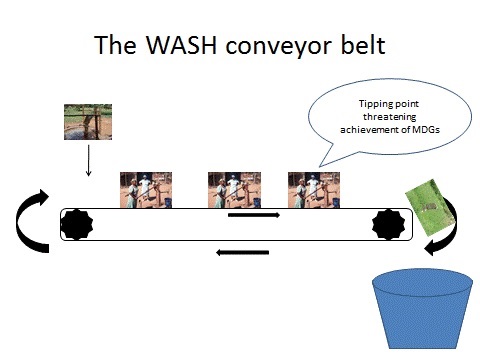Providing first time access is a matter of aid: fighting extreme poverty. But developing permanent services is a different ball game and it needs to be led by government.
Published on: 28/01/2014
I was asked to convince a Texas businessman to support investing in government water systems. I tried:
The evidence shows that more than 30% of water systems in Ghana are not functional and that only around 20% of the functioning water systems provide a basic level of service: water of WHO accepted quality, flowing 90% of the time and at a reasonable distance from the house. Meaning that 80% of the water systems in Ghana provide a bad service!
Over the last decades huge progress has been made in providing first access to water. Billions of dollars have been invested. But when countries reach 60-70% access, coverage stagnates and slips back. Like on a conveyer belt: infrastructure gains are undone by losses at the end of the belt. That not only happens in African countries but also in India.

Stagnation and slippage show that something very fundamentally is wrong in the system that delivers water. For decades that system was driven by providing first time access. Now that system needs to provide permanent water services and it can't.
Providing first time access is a matter of aid: fighting extreme poverty. But developing permanent services is a different ball game and it needs to be led by government. It needs to develop the systems for O&M, for support after construction, for spare parts, for circuit riders, for repairs and it must plan for replacement. Government should not do that all itself; communities and private sector are better equipped for doing the job – and per country their roles may be different. But government regulates it all, through policy, legislation, guidelines, subsidies to reach the ultra-poor and more.
There is absolutely nothing wrong with that. That government role is played in the US*, in Europe in any country in the world that has a certain level of wealth and where public services are being taken serious. And that is how it should be. Africa, Ghana should not be aid dependent for the rest of our times. No country should. And it won't. Ghana has become a middle income country, it has stable economic growth and it is a stable democracy. The public systems need a lot of improvement, but the trend is irreversibly going in that direction and not only in Ghana. Many other African countries are moving in that direction. Experts say that by 2050 Africa will be the China of the world (http://www.youtube.com/watch?v=2K-P7Hv_Zwg). The aid industry, IRC included, better be ready for that and start shifting the focus of its work from providing first time access to supporting the delivery of permanent services.
We are in a transition phase. But the end state is clear: permanent services for all. Under the leadership and regulated by government as in any country in the world. Both government and aid must get their act together. Government, also government in Ghana, should stop leaning and depending on good willing aid organisations. It should show leadership, vision towards the aid industry, stimulate the private sector and its citizens. Aid organisations should also get their act together and stop running around in parallel projects each with their own manual, technology, guidelines and philosophies and cooperate with local government, challenge it and at the same time align with it (see video ' what if...).
In our opinion that is the future and what we do is helping countries to gradually make that future come true. With respect for all stakeholders, aid and government, but in the first place boosting government to develop the systems and take the leadership to deliver permanent services to citizens. Aid will stop one day and it should stop one day. Aid organisations should be confident that they have supported water when it was desperately needed and can leave the country with the systems in place to provide long term access to water for all.
——-
* The US has a very well regulatory rural water sector and in the US as in many other more sparsely populated countries rural water is subsidised. The unit costs for a rural water connection are a magnitude of the unit cost for an urban connection. Cross subsidy is one of the things that a government can and should do to make water equally accessible.
At IRC we have strong opinions and we value honest and frank discussion, so you won't be surprised to hear that not all the opinions on this site represent our official policy.